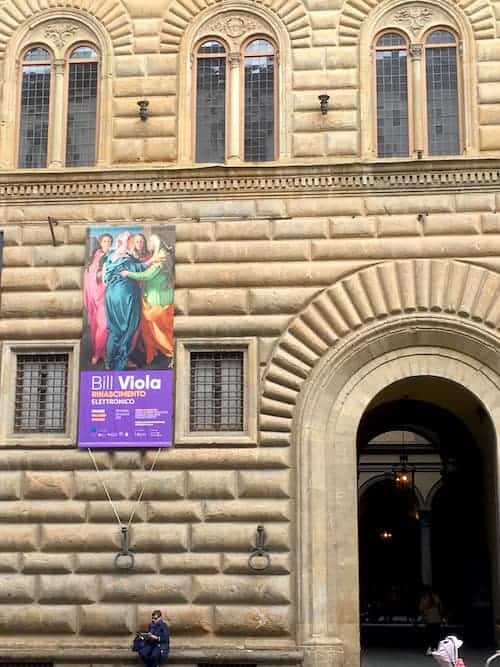
by Christina Waters | May 31, 2017 | Art, Home, Travel |
My bags are always packed!
To go from here to there is to indulge in a blend of aesthetic schizophrenia, wanderlust, and bad faith. Insisting that I love exactly where I live, I still climb onto a plane roughly once a year to become whatever the next large foreign city can make of me. Without giving up what I have, I crave what can only be gained sitting at an exotic (df. of foreign origin) table.
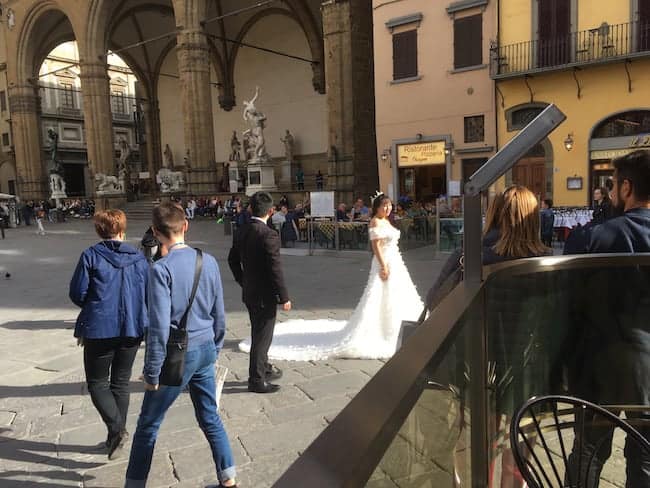 The Other Place vs Home. Each has exactly what the other lacks. The foreign city has architecture, history, and the cultural depth that only a critical mass of people, talent, and creative pressure can create. [It might also offer the spectacle of Korean newlyweds posing for nuptial photos with the Uffizi in the background.]
The Other Place vs Home. Each has exactly what the other lacks. The foreign city has architecture, history, and the cultural depth that only a critical mass of people, talent, and creative pressure can create. [It might also offer the spectacle of Korean newlyweds posing for nuptial photos with the Uffizi in the background.]
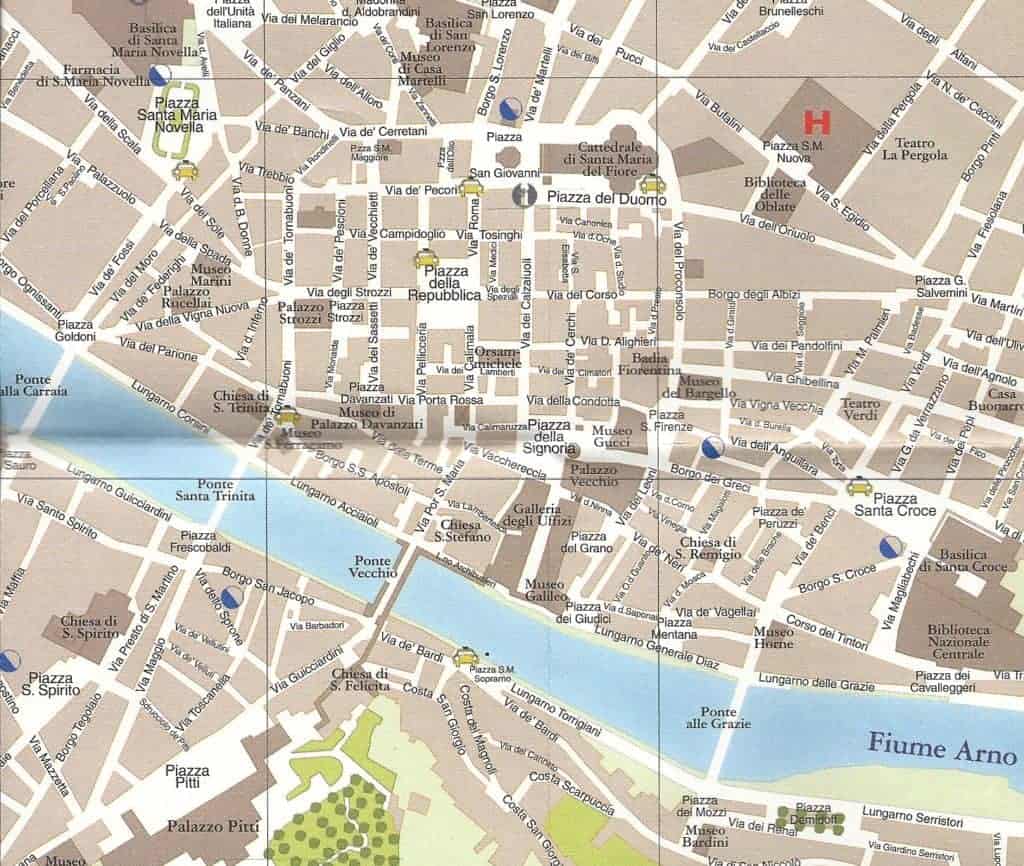    The small seaside town has coziness, hominess, familiarity. Its smaller size allows for intimacy, a sense of geographical mastery that comes with manageable scale. And it is home, a place one has lived in for years. It contains friends, lovers, colleagues—all those whose ideas and eccentricities help construct your own life.
   The small seaside town has coziness, hominess, familiarity. Its smaller size allows for intimacy, a sense of geographical mastery that comes with manageable scale. And it is home, a place one has lived in for years. It contains friends, lovers, colleagues—all those whose ideas and eccentricities help construct your own life.
Somewhere in the exact middle of these two attractive places the wanderer is suspended, not wanting to upset that balance, not wanting to have to choose.
I travel partly in order to see my home from a clearer vantage point, and nothing clarifies like distance (Antonioni knew that. So did Hemingway, and Durrell.) But also to feast and fill up upon the riches of the other—another time, another cultural sensibility, another way of moving, talking, and listening.
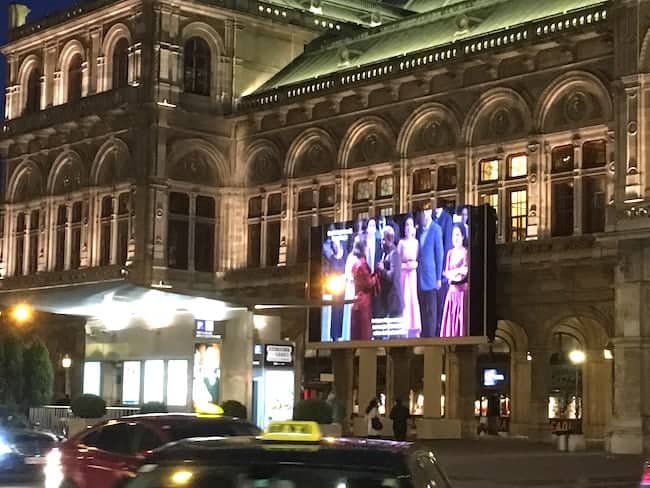 The smell of frankincense that fills the high altar of a cathedral on Sunday mornings speaks to my subconscious DNA. Was I a priest in a past life? The sound of church bells, counting out the hours, calling people to prayer, announcing this or another civic event, is part of the atmospheric soundtrack of European cities. A soundtrack missing from seaside California.
The smell of frankincense that fills the high altar of a cathedral on Sunday mornings speaks to my subconscious DNA. Was I a priest in a past life? The sound of church bells, counting out the hours, calling people to prayer, announcing this or another civic event, is part of the atmospheric soundtrack of European cities. A soundtrack missing from seaside California.
Admiring the bravura of men’s fashion in Italy I am forced to grasp the casual attire of coastal California. I see no baseball caps in Vienna, and I instantly understand the climate, the sun, the outdoor lifestyle that produces our dress code. It’s harder to see when you are in the midst, easy to spot via the extreme contrast of a metropolitan European city founded thousands of years ago by Celts.
I discovered BBC when I was in Paris several decades ago. Even though I loved French TV, the mesmerizing commercials, and pungently-dramatic soap operas, I wanted to hear some of my native language. That’s when I realized that American TV carried on as if there were no weather issues in Africa. No one mentioned incidents in the Sudan, or Myanmar. Chinese business deals weren’t given a second of air time. Bulgaria didn’t exist. The world into which I had traveled was not only larger, but my own country and its media prejudices seemed provincial by comparison.
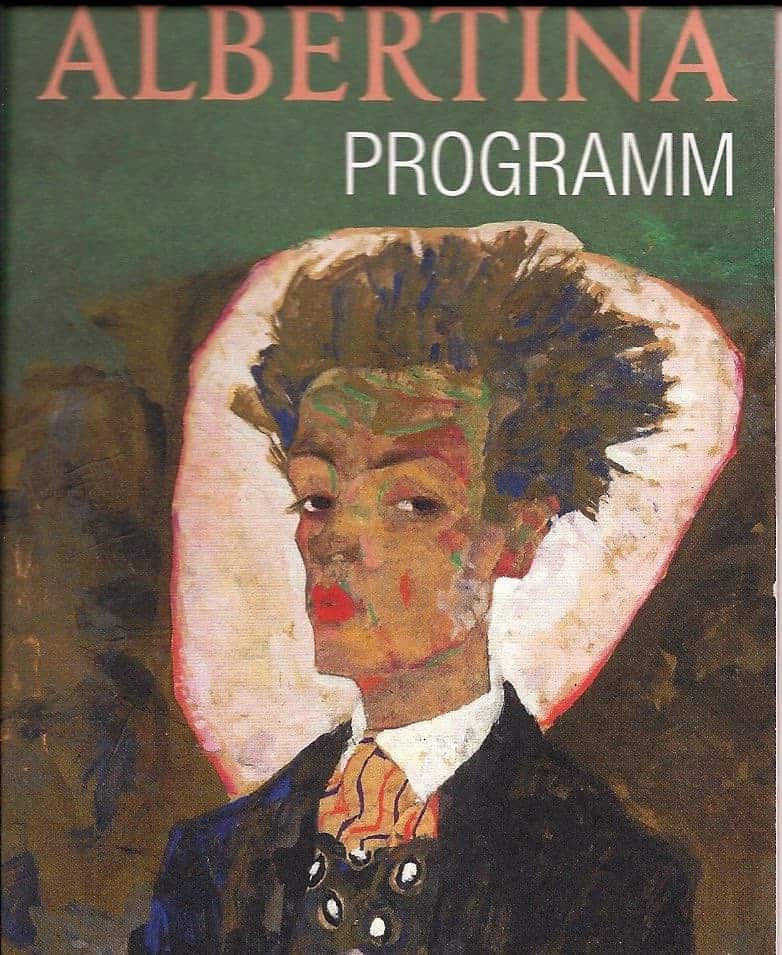 Without question we see ourselves and our cultural assumptions more clearly from afar. Travel removes me from work. I leave my laptop at home. I am frugal with my emails. Here and now details tend to define each day. I visit a museum in Florence and find it filled with engaged high school groups. I visit a Monet show in San Francisco and find it filled with white-haired nostalgics. The youthful energy and passion for the arts in Europe is both encouraging (I envy the Europeans) and sad (I am brusquely reminded of the inattention to art of the past by student-aged Americans). Yes, opera is expensive, but the queue for cheap standing room is a block-long in Vienna. All young people. Outside the US, museum tickets are inexpensive and everyone seems to take advantage of the sensory feast and stimulus to the imagination provided by innovatively-curated exhibitions. And no, I don’t mean simply parading out the content of a wealthy woman’s closet and calling it an art exhibition.
Without question we see ourselves and our cultural assumptions more clearly from afar. Travel removes me from work. I leave my laptop at home. I am frugal with my emails. Here and now details tend to define each day. I visit a museum in Florence and find it filled with engaged high school groups. I visit a Monet show in San Francisco and find it filled with white-haired nostalgics. The youthful energy and passion for the arts in Europe is both encouraging (I envy the Europeans) and sad (I am brusquely reminded of the inattention to art of the past by student-aged Americans). Yes, opera is expensive, but the queue for cheap standing room is a block-long in Vienna. All young people. Outside the US, museum tickets are inexpensive and everyone seems to take advantage of the sensory feast and stimulus to the imagination provided by innovatively-curated exhibitions. And no, I don’t mean simply parading out the content of a wealthy woman’s closet and calling it an art exhibition.
Does travel expand our consciousness? Does the Pope suffer fools?
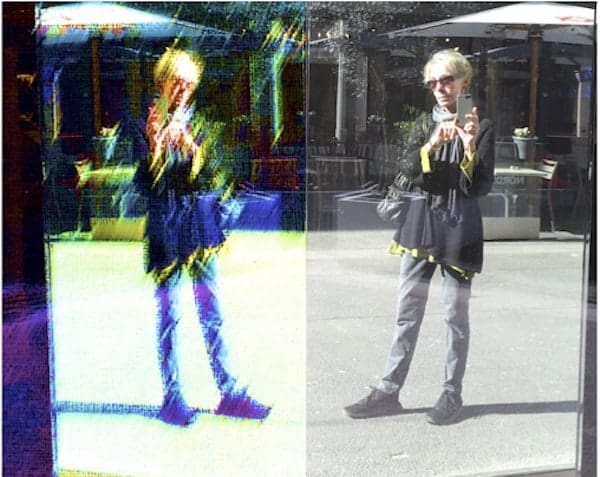
Bilocation and other travel puzzles
by Christina Waters | May 24, 2017 | Home, Travel |
Ah the unavoidable psycho-physical malaise of bilocation—the doubling of oneself that happens between travel and homecoming. Think of it as a variation on the mind/body problem.
Our body is spatially bound but our consciousness is adrift; e.g. somewhere near the Palazzo Vecchio, or gazing into the orchestra pit just before the overture begins. Our mind wanders in ways that our body cannot.
My hands have to be on a keyboard making sure I submit a story on time, but my imagination is unbounded by such constraints. While my body retains much of the sensory impressions of recent travel—the rolling vibration of a train ride, the feeling of the French horns thundering the entry of the gods into Valhalla—my thoughts and images are free to continue the sensory feast I’ve just seen, heard, tasted and felt.
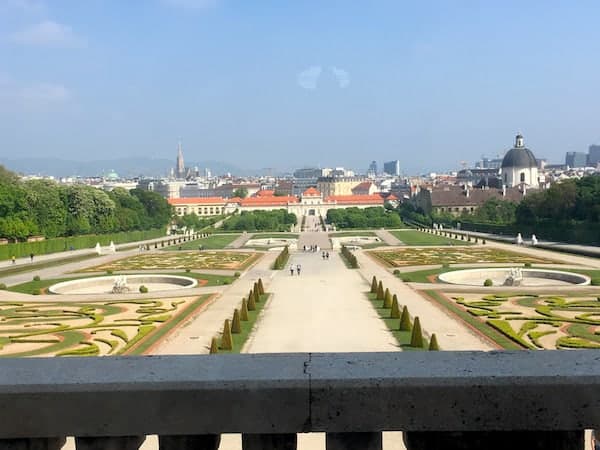 I can still taste the sour cherry gelato I had at Corona’s at the corner of the Piazza de la Republica in Florence. I use “taste” in a quasi-metaphorical, quasi-magical sense. And because I can still taste it, I can still be there, feeling the afternoon sun, hearing the bells ringing six o’clock.
I can still taste the sour cherry gelato I had at Corona’s at the corner of the Piazza de la Republica in Florence. I use “taste” in a quasi-metaphorical, quasi-magical sense. And because I can still taste it, I can still be there, feeling the afternoon sun, hearing the bells ringing six o’clock.
The sensation of being both here and there lingers as if the body had been imprinted with the entire movement, architecture, music, flavors, and visual feasts of the duration of being far away. All of it inhabits me. I bring it back when I return and try to keep it close. I recite my memories of each day of travel, everything I saw, the people I met, the wines I tasted, and as I recite these experiences—telling them to myself, and to others—I keep the illusion of “being there” intact. But soon all those pungent and vital impressions start to fade, much as footsteps in the sand gradually eroding by the force of the tides.
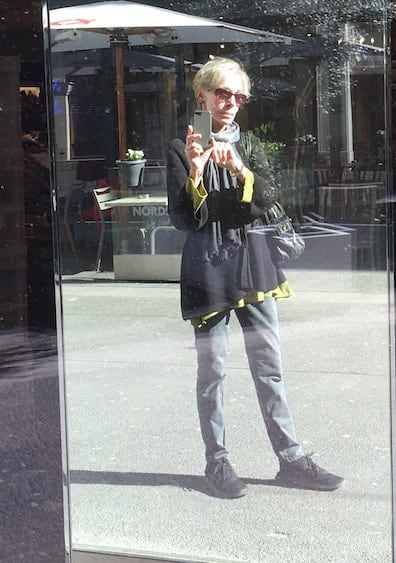 Soon the feeling of being in a single space, the place of “now” solidifies. It becomes firm. I am no longer far away, no longer in the midst of travel, I am back. I am here, in a single location. And the minute I feel that, I am corraled by a single here and present. And I ache for the freedom of travel. And I want to get back on a plane and expand myself into that other location. I want to double my self, my life, my days for as long, and as many as I can.
Soon the feeling of being in a single space, the place of “now” solidifies. It becomes firm. I am no longer far away, no longer in the midst of travel, I am back. I am here, in a single location. And the minute I feel that, I am corraled by a single here and present. And I ache for the freedom of travel. And I want to get back on a plane and expand myself into that other location. I want to double my self, my life, my days for as long, and as many as I can.
It is an ever-receding horizon. An illusion. Fata morgana.
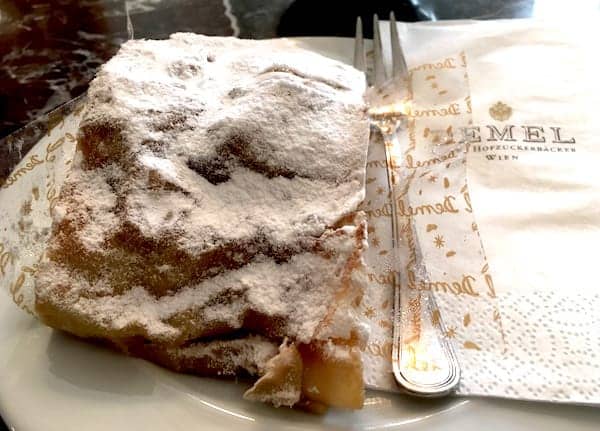
Authentic Cuisine
by Christina Waters | May 19, 2017 | Food, Home |
Now this is strudel! I was seated at the dark wood bar of Demel’s, arguably the most famed and luxurious coffeehouse in Vienna—where the coffeehouse was invented 300 years ago. From a vast kitchen not 20 paces from where I sat had come this insanely fine creation of apples, walnuts, golden raisins, and spices wrapped in an ethereal pastry and dusted with powdered sugar. Here was a barely sweetened, hand-created bit of regional cuisine that had launched an empire of afternoon indulgence. And nothing that appeared on any American menu could come close.
That’s the thing. Lots of restaurants have a line item under Desserts that says “Apple Strudel.” If you order it, you’ll be brought something resembling a thick cocoon of pastry filled with sweetened apples and spices. It might even be tasty. But it will never be as confident, as gossamer, or as satisfying from first to last bite as was this cloud of Viennese smugness I consumed—along with a double macchiatto—at Demel’s. I was tasting the Real Thing in its native habitat. It was never going to get any better than that.
 Part of why I travel—and I suspect it’s at least partially true for everyone—is to sample the food of the place. Food enshrines cultural attitudes, pride, folklore, and long ancient traditions as much as it does exotic ingredients and foreign cooking styles. To visit Italy, for example, and search for cheeseburgers, is to miss the point. It is to miss the priceless opportunity to be fully inside the space/time envelope all around you.
Part of why I travel—and I suspect it’s at least partially true for everyone—is to sample the food of the place. Food enshrines cultural attitudes, pride, folklore, and long ancient traditions as much as it does exotic ingredients and foreign cooking styles. To visit Italy, for example, and search for cheeseburgers, is to miss the point. It is to miss the priceless opportunity to be fully inside the space/time envelope all around you.
To resist schnitzel in Vienna is to reject the entire point of why this place is not Atlanta, or any other place in the world. And in that first bite of well-made Wiener Schnitzel, with its crunchy feather-light battered crust, and its juicy interior—with the squeeze of fresh lemon, the forkful of roast potatoes—is a long-established and regionally specific flavor. It is a taste of the place. Those flavors convey an understanding of where you are, and whose history created it that can’t be gained in any other way. Even if there aren’t words to express just exactly what you’ve discovered in that meal.
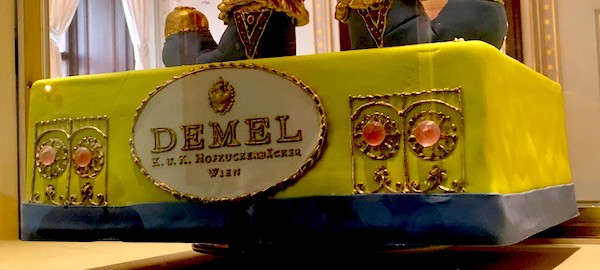
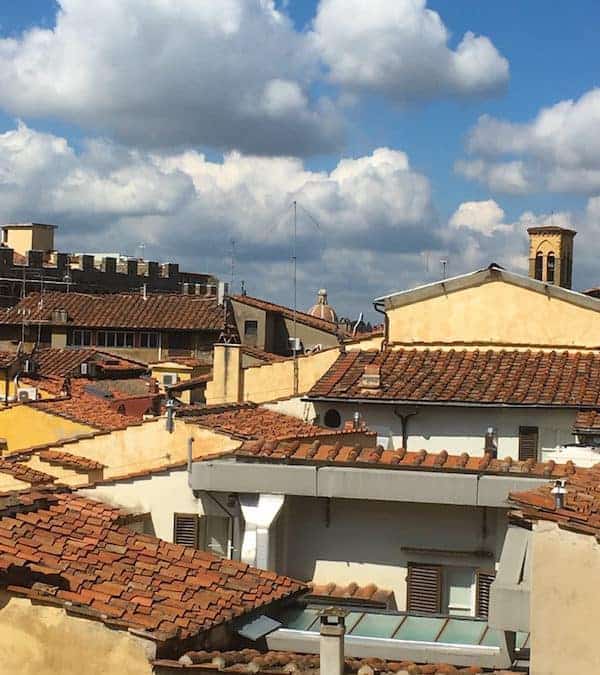
Time Travel Conflicts
by Christina Waters | May 16, 2017 | Art, Home, Travel |
There are many forms of being in conflict with oneself, but few are as universal, if irrational, as that feeling you have after a satisfying trip far away from your everyday life. For two weeks I was lucky enough to be in Vienna and, briefly, Florence. By the end of the richly rewarding journey of sensory pleasures—opera, concerts, art exhibitions, regional cuisine, architecture—it was time to come home. Yet a mere 24 hours after being back, and after soaking up the enjoyment of my sweetheart, my own bed, the foods I love….I longed to be back in a great European city that could not possibly be more different than the small seaside town in California where I live.
What is that about?
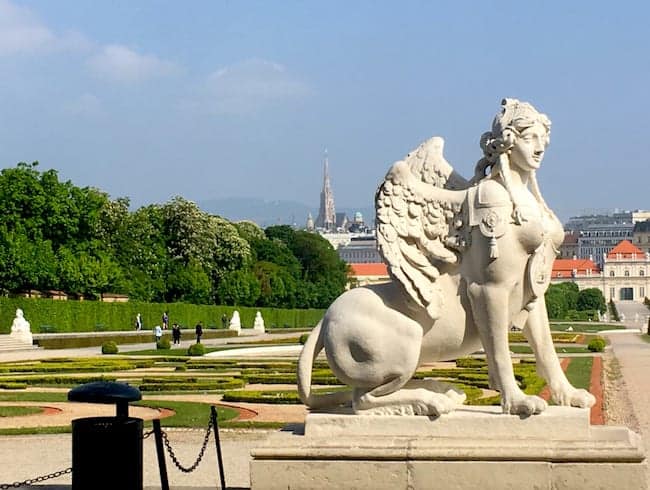 Nothing feels better than coming home after a stretch of time in which each day has required strategizing over where you will eat, whether your grasp of German and Italian (or whatever non-native language) will suffice without causing howls of derision, walking until your feet scream, struggling with jet lag, and dining with strangers or alone with only your cell phone (or a book!) for company. Being at home means never having to say “come se dice “clueless” in Italiano.” Being at home means not having to endure the specific humiliation of being handed a menu in English when you’ve worked your butt off to master restaurant German. Being at home means not having to negotiate hieroglyphic subway signage, taxi prices, the ridiculously small size of street names on maps that you’re trying not to be seen using.
Nothing feels better than coming home after a stretch of time in which each day has required strategizing over where you will eat, whether your grasp of German and Italian (or whatever non-native language) will suffice without causing howls of derision, walking until your feet scream, struggling with jet lag, and dining with strangers or alone with only your cell phone (or a book!) for company. Being at home means never having to say “come se dice “clueless” in Italiano.” Being at home means not having to endure the specific humiliation of being handed a menu in English when you’ve worked your butt off to master restaurant German. Being at home means not having to negotiate hieroglyphic subway signage, taxi prices, the ridiculously small size of street names on maps that you’re trying not to be seen using.
 But as Sartre liked to remind us, nothing makes us feel as alive as struggle. Nor does the successful result leave as lasting an impact as when we had to work for it. Adversity is bracing. And that sense of quest, of having to work for the cold beer at the top of the hill, or that first glimpse of the Duomo after a 12-hour plane trip—these are what sweeten both the present moment, and that lasting memory of travel.
But as Sartre liked to remind us, nothing makes us feel as alive as struggle. Nor does the successful result leave as lasting an impact as when we had to work for it. Adversity is bracing. And that sense of quest, of having to work for the cold beer at the top of the hill, or that first glimpse of the Duomo after a 12-hour plane trip—these are what sweeten both the present moment, and that lasting memory of travel.
 And then there’s the slammed against the wall discomfort and disarray of long-distance travel. The customs lines, the dishevelment of TSA, the spatial cram and compromise of airplane seating, the out-of-body haze of having been semi-conscious for 20 hours and then having to check into a hotel with something close to dignity. [A sidebar you’ll enjoy: as my Slovakian cabbie approached the inner city of Vienna, he was stopped at the bridge over the Donau canal. According to the polizei, all roads to the old city were closed. It was a Friday, the end of April. No explanations. My poor driver was apologetic but he had to let me out right there, with only a few indications of where I should go—straight ahead, turn right, then another left to my hotel. This is after SFO to Frankfurt, Frankfurt to Vienna, 15 hours of travel and loaded down with one huge rolling suitcase and another carry-on case. I had to actually roll both cases through the streets of Vienna, ask for directions twice, then go the long way through throngs of student tour groups and people with selfie sticks all clustered around the huge cathedral, just attempting to stay on my feet. Arms aching, utterly wiped out, I made it to my hotel. Not my best travel memory.]
And then there’s the slammed against the wall discomfort and disarray of long-distance travel. The customs lines, the dishevelment of TSA, the spatial cram and compromise of airplane seating, the out-of-body haze of having been semi-conscious for 20 hours and then having to check into a hotel with something close to dignity. [A sidebar you’ll enjoy: as my Slovakian cabbie approached the inner city of Vienna, he was stopped at the bridge over the Donau canal. According to the polizei, all roads to the old city were closed. It was a Friday, the end of April. No explanations. My poor driver was apologetic but he had to let me out right there, with only a few indications of where I should go—straight ahead, turn right, then another left to my hotel. This is after SFO to Frankfurt, Frankfurt to Vienna, 15 hours of travel and loaded down with one huge rolling suitcase and another carry-on case. I had to actually roll both cases through the streets of Vienna, ask for directions twice, then go the long way through throngs of student tour groups and people with selfie sticks all clustered around the huge cathedral, just attempting to stay on my feet. Arms aching, utterly wiped out, I made it to my hotel. Not my best travel memory.]
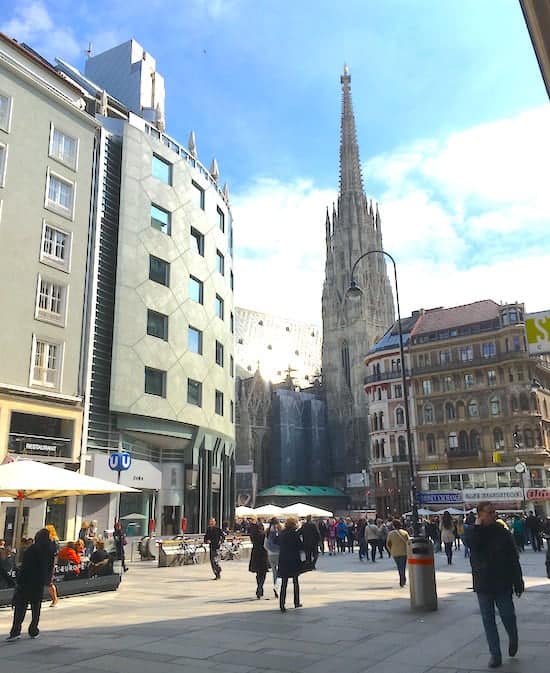 There’s more to ponder here. Once jetlag and the utter exhaustion of the long flight wore off, I began to walk the streets, learn where my favorite new cafes were, meet up with fellow opera-lovers for the many evenings of great music, revisit museums I hadn’t seen since grad school. In other words, I began residency in a new world. I had carved out yet another life, a new identity in which I was psychologically at least in two places at once.
There’s more to ponder here. Once jetlag and the utter exhaustion of the long flight wore off, I began to walk the streets, learn where my favorite new cafes were, meet up with fellow opera-lovers for the many evenings of great music, revisit museums I hadn’t seen since grad school. In other words, I began residency in a new world. I had carved out yet another life, a new identity in which I was psychologically at least in two places at once.
And that may be the key to this double bind, this longing to be home while wishing to be traveling again. Going far enough away from familiar scenes that you are forced to see differently, move differently, speak differently, creates a new existence. I had extended my life by two weeks, carving out more time and more space while still being my “real” self in my “real” identity.
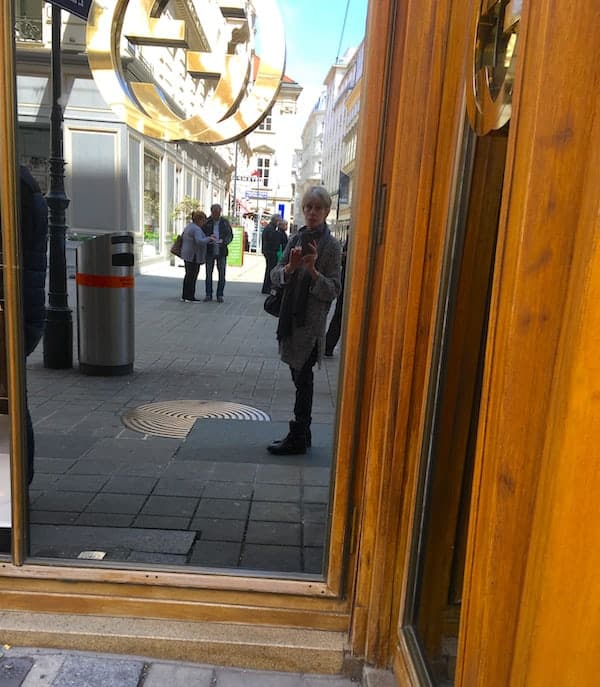 Travel gives us not only new spaces, it gives us more time. And the illusion of an expanded life. I can live in two places at once. At least for a while—as long as my feet (and my money) hold out.
Travel gives us not only new spaces, it gives us more time. And the illusion of an expanded life. I can live in two places at once. At least for a while—as long as my feet (and my money) hold out.

the ugly underbelly
by Christina Waters | Apr 12, 2017 | Book, Home |
Being an Author: the true story. . . Think twice before you fantasize about becoming an author. In the six months leading up to the publication of my book, Inside the Flame, and for the past five months afterwards, I have been enslaved to blog writing, Facebooking, and at least five other varieties of social media.
It’s taken me as long to set up the social media sites and incessant code-governed practices required of today’s publishing—as long as it took me to actually write the book.  Doing all of this is nothing short of hell, especially since most of us who write books simply wanted to write the damn thing. We didn’t want to become literary hookers selling ourselves and our ideas like so much virtual meat on any number of well-used digital platforms
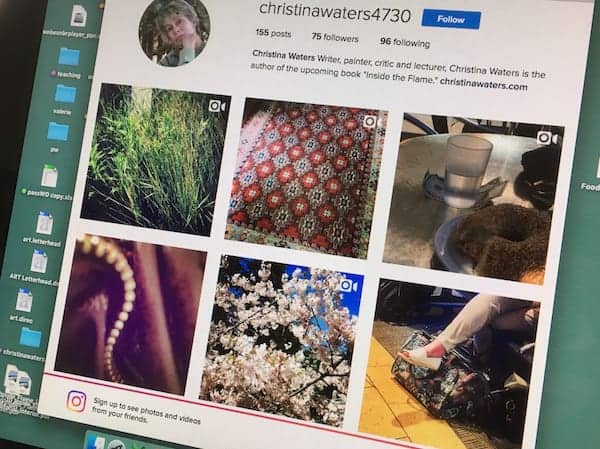
Every morning I change my cover image on Facebook. Every morning I post an image, or an article, or a new mini-post about my book. On Facebook. And on LinkedIn. And on my website christinawaters.com, and on my Facebook Author site. Then I make sure I post something intriguing each week on Instagram, and on Goodreads. By Friday I’m exhausted, and still I cannot stop.
I need to create and line up at least three new posts for my Author page. Every. Week. Find images for them. And schedule them to go off like landmines all during the week.
Oh, did I forget to mention being held hostage by Constant Contact? Yes indeedy. You are not only required to create interesting content, as well as cheer-leaderesque self-promotional hypola, you’re required to package each week’s upbeat cry for attention (the weekly update) in an attractive manner. One that requires mining the internet for images. Cutting those images into the template’s preferred size. Writing excited emotionally-charged text, adding the appropriate links to places, people, and events tied into your product, i.e. The Book. Then the little announcement must be emailed out to potential, or alleged readers on your evolving email string.
And you must purchase this service using real money you may or may not actually have. Are you with me so far?

If I have a scheduled, in-person appearance, it gets worse. All the blogging, the social mediating, the posting, multiplies exponentially. Invite people. Tag people. Take pictures. Circulate the pictures. Post on friends’ sites, and when they post on mine, I immediately swoop in and thank them. “Excited!” I squeal (electronically). I feel like a needy and desperate performance artist enacting a public artwork for the benefit of a very few who have the time, the patience, and/or the inclination to dig deeper into what I’m up to than simply following my weekly food, wine, and art columns in GTWeekly.
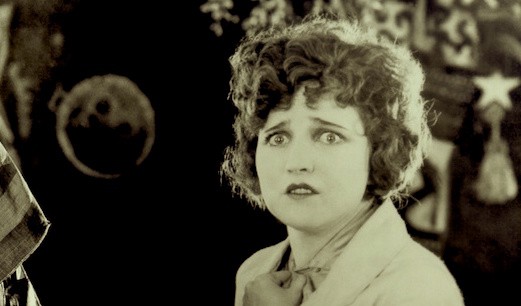
People seem to love it when I’m irreverent, or highly opinionated, or critical of some public event which did not exactly deliver what I paid for.
People are less inclined to actually read an article, a thought-piece, or a critical essay in which I connect some intellectually or socially relevant dots and lead up to a reasoned (or at least well-illustrated) conclusion.
Here’s the deal: No one has any time. Everyone is overloaded. We are all overwhelmed with electronica, with digital obligations, with mindless FB happy talk and emoticon porno.
I’m exhausted. Worse. I’ve begun to turn on my own work.
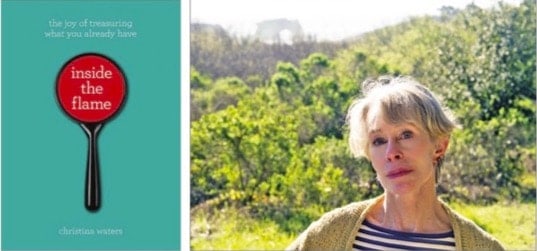
Carmel Book Meet & Greet!
by Christina Waters | Apr 2, 2017 | Book, Home |
Carmel was always the spot my aunt favored for weekend getaways. “Let’s go window-shopping,” she would say, and away we went. Like a miniature English country village, Carmel seemed to offer an endless parade of intriguing pocket gardens, shops filled with color and dazzle, and small cafes for lingering in between excursions.
We would walk and walk, peek in windows, shop, eat, something sweet, and watch the people passing by. Such fun!
The village on the coast still holds its attraction, which is why I am thrilled to be making an appearance Saturday April 8th from 1-3pm at Pilgrim’s Way Bookstore, one of those authentic independent bookstores filled with exactly the books you want. My book Inside the Flame: the joy of treasuring what you already have will be there. And so will I and my friend Patrice Vecchione. Patrice is one of those creative writer/artists who never sleeps and is well known to legions of students in the Monterey Bay area. We’ll be there to talk about books, and I’ll be signing copies of my book Inside the Flame.
Exactly the sort of Carmel event my aunt would have loved.
Come join us! Purchase of my book Inside the Flame earns you a complimentary wine tasting at the nearby Windy Oaks Estates Tasting Room.
[I think you’ll be interested in my Artist Profile on game designer Elizabeth Swensen in the current GTWeekly!]
Meet & Greet Book Launch with author Christina Waters, PhD
  Saturday — April 8th — 1-3pm
  Pilgrim’s Way Bookstore & Secret Garden
  Dolores between 5th & 6th, Carmel

 The Other Place vs Home. Each has exactly what the other lacks. The foreign city has architecture, history, and the cultural depth that only a critical mass of people, talent, and creative pressure can create. [It might also offer the spectacle of Korean newlyweds posing for nuptial photos with the Uffizi in the background.]
The Other Place vs Home. Each has exactly what the other lacks. The foreign city has architecture, history, and the cultural depth that only a critical mass of people, talent, and creative pressure can create. [It might also offer the spectacle of Korean newlyweds posing for nuptial photos with the Uffizi in the background.]    The small seaside town has coziness, hominess, familiarity. Its smaller size allows for intimacy, a sense of geographical mastery that comes with manageable scale. And it is home, a place one has lived in for years. It contains friends, lovers, colleagues—all those whose ideas and eccentricities help construct your own life.
   The small seaside town has coziness, hominess, familiarity. Its smaller size allows for intimacy, a sense of geographical mastery that comes with manageable scale. And it is home, a place one has lived in for years. It contains friends, lovers, colleagues—all those whose ideas and eccentricities help construct your own life. The smell of frankincense that fills the high altar of a cathedral on Sunday mornings speaks to my subconscious DNA. Was I a priest in a past life? The sound of church bells, counting out the hours, calling people to prayer, announcing this or another civic event, is part of the atmospheric soundtrack of European cities. A soundtrack missing from seaside California.
The smell of frankincense that fills the high altar of a cathedral on Sunday mornings speaks to my subconscious DNA. Was I a priest in a past life? The sound of church bells, counting out the hours, calling people to prayer, announcing this or another civic event, is part of the atmospheric soundtrack of European cities. A soundtrack missing from seaside California. Without question we see ourselves and our cultural assumptions more clearly from afar. Travel removes me from work. I leave my laptop at home. I am frugal with my emails. Here and now details tend to define each day. I visit a museum in Florence and find it filled with engaged high school groups. I visit a Monet show in San Francisco and find it filled with white-haired nostalgics. The youthful energy and passion for the arts in Europe is both encouraging (I envy the Europeans) and sad (I am brusquely reminded of the inattention to art of the past by student-aged Americans). Yes, opera is expensive, but the queue for cheap standing room is a block-long in Vienna. All young people. Outside the US, museum tickets are inexpensive and everyone seems to take advantage of the sensory feast and stimulus to the imagination provided by innovatively-curated exhibitions. And no, I don’t mean simply parading out the content of a wealthy woman’s closet and calling it an art exhibition.
Without question we see ourselves and our cultural assumptions more clearly from afar. Travel removes me from work. I leave my laptop at home. I am frugal with my emails. Here and now details tend to define each day. I visit a museum in Florence and find it filled with engaged high school groups. I visit a Monet show in San Francisco and find it filled with white-haired nostalgics. The youthful energy and passion for the arts in Europe is both encouraging (I envy the Europeans) and sad (I am brusquely reminded of the inattention to art of the past by student-aged Americans). Yes, opera is expensive, but the queue for cheap standing room is a block-long in Vienna. All young people. Outside the US, museum tickets are inexpensive and everyone seems to take advantage of the sensory feast and stimulus to the imagination provided by innovatively-curated exhibitions. And no, I don’t mean simply parading out the content of a wealthy woman’s closet and calling it an art exhibition.

 I can still taste the sour cherry gelato I had at Corona’s at the corner of the Piazza de la Republica in Florence. I use “taste” in a quasi-metaphorical, quasi-magical sense. And because I can still taste it, I can still be there, feeling the afternoon sun, hearing the bells ringing six o’clock.
I can still taste the sour cherry gelato I had at Corona’s at the corner of the Piazza de la Republica in Florence. I use “taste” in a quasi-metaphorical, quasi-magical sense. And because I can still taste it, I can still be there, feeling the afternoon sun, hearing the bells ringing six o’clock. Soon the feeling of being in a single space, the place of “now” solidifies. It becomes firm. I am no longer far away, no longer in the midst of travel, I am back. I am here, in a single location. And the minute I feel that, I am corraled by a single here and present. And I ache for the freedom of travel. And I want to get back on a plane and expand myself into that other location. I want to double my self, my life, my days for as long, and as many as I can.
Soon the feeling of being in a single space, the place of “now” solidifies. It becomes firm. I am no longer far away, no longer in the midst of travel, I am back. I am here, in a single location. And the minute I feel that, I am corraled by a single here and present. And I ache for the freedom of travel. And I want to get back on a plane and expand myself into that other location. I want to double my self, my life, my days for as long, and as many as I can.
 Part of why I travel—and I suspect it’s at least partially true for everyone—is to sample the food of the place. Food enshrines cultural attitudes, pride, folklore, and long ancient traditions as much as it does exotic ingredients and foreign cooking styles. To visit Italy, for example, and search for cheeseburgers, is to miss the point. It is to miss the priceless opportunity to be fully inside the space/time envelope all around you.
Part of why I travel—and I suspect it’s at least partially true for everyone—is to sample the food of the place. Food enshrines cultural attitudes, pride, folklore, and long ancient traditions as much as it does exotic ingredients and foreign cooking styles. To visit Italy, for example, and search for cheeseburgers, is to miss the point. It is to miss the priceless opportunity to be fully inside the space/time envelope all around you.

 Nothing feels better than coming home after a stretch of time in which each day has required strategizing over where you will eat, whether your grasp of German and Italian (or whatever non-native language) will suffice without causing howls of derision, walking until your feet scream, struggling with jet lag, and dining with strangers or alone with only your cell phone (or a book!) for company. Being at home means never having to say “come se dice “clueless” in Italiano.” Being at home means not having to endure the specific humiliation of being handed a menu in English when you’ve worked your butt off to master restaurant German. Being at home means not having to negotiate hieroglyphic subway signage, taxi prices, the ridiculously small size of street names on maps that you’re trying not to be seen using.
Nothing feels better than coming home after a stretch of time in which each day has required strategizing over where you will eat, whether your grasp of German and Italian (or whatever non-native language) will suffice without causing howls of derision, walking until your feet scream, struggling with jet lag, and dining with strangers or alone with only your cell phone (or a book!) for company. Being at home means never having to say “come se dice “clueless” in Italiano.” Being at home means not having to endure the specific humiliation of being handed a menu in English when you’ve worked your butt off to master restaurant German. Being at home means not having to negotiate hieroglyphic subway signage, taxi prices, the ridiculously small size of street names on maps that you’re trying not to be seen using. But as Sartre liked to remind us, nothing makes us feel as alive as struggle. Nor does the successful result leave as lasting an impact as when we had to work for it. Adversity is bracing. And that sense of quest, of having to work for the cold beer at the top of the hill, or that first glimpse of the Duomo after a 12-hour plane trip—these are what sweeten both the present moment, and that lasting memory of travel.
But as Sartre liked to remind us, nothing makes us feel as alive as struggle. Nor does the successful result leave as lasting an impact as when we had to work for it. Adversity is bracing. And that sense of quest, of having to work for the cold beer at the top of the hill, or that first glimpse of the Duomo after a 12-hour plane trip—these are what sweeten both the present moment, and that lasting memory of travel. And then there’s the slammed against the wall discomfort and disarray of long-distance travel. The customs lines, the dishevelment of TSA, the spatial cram and compromise of airplane seating, the out-of-body haze of having been semi-conscious for 20 hours and then having to check into a hotel with something close to dignity. [A sidebar you’ll enjoy: as my Slovakian cabbie approached the inner city of Vienna, he was stopped at the bridge over the Donau canal. According to the polizei, all roads to the old city were closed. It was a Friday, the end of April. No explanations. My poor driver was apologetic but he had to let me out right there, with only a few indications of where I should go—straight ahead, turn right, then another left to my hotel. This is after SFO to Frankfurt, Frankfurt to Vienna, 15 hours of travel and loaded down with one huge rolling suitcase and another carry-on case. I had to actually roll both cases through the streets of Vienna, ask for directions twice, then go the long way through throngs of student tour groups and people with selfie sticks all clustered around the huge cathedral, just attempting to stay on my feet. Arms aching, utterly wiped out, I made it to my hotel. Not my best travel memory.]
And then there’s the slammed against the wall discomfort and disarray of long-distance travel. The customs lines, the dishevelment of TSA, the spatial cram and compromise of airplane seating, the out-of-body haze of having been semi-conscious for 20 hours and then having to check into a hotel with something close to dignity. [A sidebar you’ll enjoy: as my Slovakian cabbie approached the inner city of Vienna, he was stopped at the bridge over the Donau canal. According to the polizei, all roads to the old city were closed. It was a Friday, the end of April. No explanations. My poor driver was apologetic but he had to let me out right there, with only a few indications of where I should go—straight ahead, turn right, then another left to my hotel. This is after SFO to Frankfurt, Frankfurt to Vienna, 15 hours of travel and loaded down with one huge rolling suitcase and another carry-on case. I had to actually roll both cases through the streets of Vienna, ask for directions twice, then go the long way through throngs of student tour groups and people with selfie sticks all clustered around the huge cathedral, just attempting to stay on my feet. Arms aching, utterly wiped out, I made it to my hotel. Not my best travel memory.] There’s more to ponder here. Once jetlag and the utter exhaustion of the long flight wore off, I began to walk the streets, learn where my favorite new cafes were, meet up with fellow opera-lovers for the many evenings of great music, revisit museums I hadn’t seen since grad school. In other words, I began residency in a new world. I had carved out yet another life, a new identity in which I was psychologically at least in two places at once.
There’s more to ponder here. Once jetlag and the utter exhaustion of the long flight wore off, I began to walk the streets, learn where my favorite new cafes were, meet up with fellow opera-lovers for the many evenings of great music, revisit museums I hadn’t seen since grad school. In other words, I began residency in a new world. I had carved out yet another life, a new identity in which I was psychologically at least in two places at once. Travel gives us not only new spaces, it gives us more time. And the illusion of an expanded life. I can live in two places at once. At least for a while—as long as my feet (and my money) hold out.
Travel gives us not only new spaces, it gives us more time. And the illusion of an expanded life. I can live in two places at once. At least for a while—as long as my feet (and my money) hold out.




